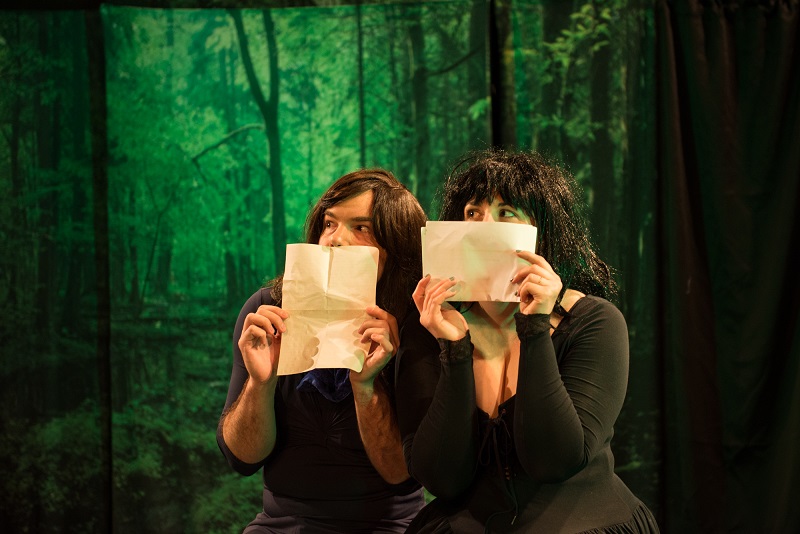Welcome to our second pair of reviews from the 2018 FRIGID Festival. Every year at this time, FRIGID brings a host of indie plays to the Kraine Theater and UNDER St. Mark's in New York City's East VIllage. The productions are limited to an hour, all proceeds from ticket sales go directly to the artists, and audiences can vote for their favorite show online. The FRIGID website also information on the 25 other plays that we were unable to discuss here, from a solo show about polyamory to a show about the contemporary reappearance of five-time early twentieth-century Socialist presidential candidate Eugene Debs. The festival winds down the first weekend in March, so don't get caught out in the cold! (Or in the unseasonable warmth -- it's hard to predict these days.)
Anyone who has moved in NYC without professional help knows that it can be a difficult experience. Moving in for the first time with a romantic partner certainly has the potential to add to the stress, and doing it in a heatwave is almost guaranteed to make at least one person irritable. Daniel (Max Henry) and Tina (Zahra Ruffin) hit the trifecta, moving themselves to Crown Heights in ninety-degree weather in order to begin cohabiting. Henry and Ruffin winningly establish Daniel and Tina's affection for one another in their teasing and their easy familiarity. In a nice touch, to represent the belongings being unpacked, the actors draw some of them in chalk on the walls, suggesting Daniel and Tina "creating" their shared space. Of course, amongst the sweat and the fatigue, disagreements arise. She, for example, wants their Amazon Alexa in the bedroom; he dislikes the idea of a keeping an always-listening corporate agent in their most private space. These typical relationship rough spots are augmented, though, with some additional underlying tensions because Daniel is white and Jewish and Tina is Black. Tina is less than impressed when Daniel uses diverse as a synonym for dangerous, and when some of his jokes cross into problematic territory. She is saddened when Daniel reveals to her that what she thought was a positive experience with a member of his family was in fact tinged by racism. She also tries to be empathetic, asking Daniel if he had ever experienced overt anti-semitism. Eventually, however, the smaller conflicts escalate into a flat-out argument, which in turn accidentally plays a role in something much worse, the realization of a fear that has probably gone through the mind of anyone who has wrestled an air conditioner into an upper-floor apartment window. Daniel and Tina's situation intersects with the complicated issues that inhere in gentrification. While Tina grew up solidly middle class, neither she nor Daniel has really begun a career, so does their current level of income mitigate their taking housing that might otherwise be available to long-time, working-class residents of the neighborhood? Are they participating in the "apartment tourism" that she condemns (moving in, failing to contribute to a neighborhood, and then moving on)? Their experience also touches on the structural and individual racism in the rental market and their relationship to gentrification. As a symbol, Daniel and Tina's joint accident cleverly, and tragically, literalizes the kind of injury to the neighborhood that they fear being party to.
Daniel and Tina are both nuanced characters, both flawed: she acts questionably when she fears that the justice system will ruin the rest of her life; he expresses resentment at, as he frames it, living in an unending race and gender studies class. The play actually felt longer than its run-time, which is a compliment: it packs a lot of emotional journey into its 60 minutes, facilitated by the superb performances of Henry and Ruffin. Gerrard James and Donnell E. Smith as, respectively, the overzealous Officer McRoy and the more level Officer Davis -- who is himself in a relationship with a Jewish woman and who talks about how the landlords who gentrify buildings don't follow building codes and laws -- are similarly impressive, and funny, in the relatively short time that they appear. Complementing the symbolism of the accident is the way that the neighborhood itself, aside from the police, remains outside, offstage, although some of its voices penetrate the couple's apartment at the beginning and end of the play. The ambiguous ending does not pretend to resolve the issues that the play raises, and the question of whether and how they can forgive themselves takes on multiple dimensions. By turns funny, biting, and affecting, Mad Cool gets a recommendation as high as a precarious window unit.

It's interesting and entertaining to hear Shakespearean verse and prose filtered through contemporary American affects, from Dillon's stoner enunciation to the drawling inflections of Weigandt's Nashville belle Audrey to the vocal fry of Yosco's Phoebe, who might be on her way to a club in Arden's meatpacking district. As He Likes It is a true ensemble piece, propelled by a game, charismatic cast. Sears' Orlando is generally understated and genuine, Dillon gets to go big with some of the broadest comedy, and Katherine Yacko is truly a Hymen for our times, while further highlights come from the interplay between Yosco (pulling triple duty as an actor, adapter, and director) as Phoebe and Watt as Silvia, and between Amanda Nicastro as Celia and Songy as a sometimes petulant Ross. As He Likes It is a sharp, self-aware, indecorous, ebullient good time (and that's even though the weed isn't real). - Leah Richards & John Ziegler
